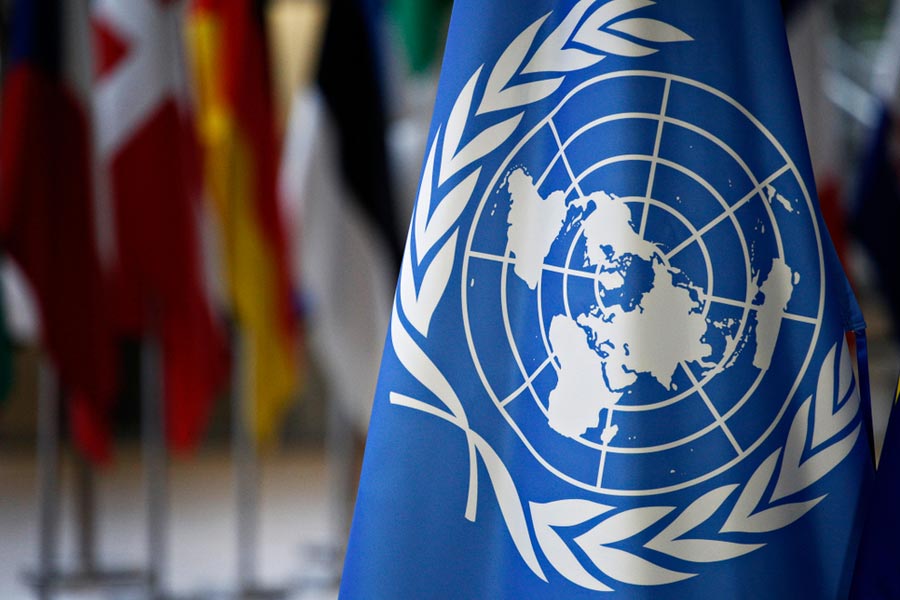Afghanistan's Taliban-appointed Interior Minister Sirajuddin Haqqani is reportedly seeking to take under his control the most promising economic projects, primarily the construction of the Afghan section of the Turkmenistan-Afghanistan-Pakistan-India gas pipeline, a UN report has said.
The fourteenth report of the Analytical Support and Sanctions Monitoring Team of the 1988 Taliban Sanctions Committee of the UN Security Council said that discord among Taliban officials over the distribution of positions in the de facto state apparatus and provincial administrations is “significant”.
“Disagreements are reportedly rife between acting Interior Minister and leader of the Haqqani Network, Sirajuddin Haqqani and acting First Deputy Prime Minister, Mullah Baradar,” the report, issued here on Friday, said.
It added that while Baradar has "less influence" in government, he retains the support of southern provincial administrations. In addition, Baradar is seeking to control the process for the Taliban gaining international recognition, unfreezing Afghan assets abroad and expanding foreign assistance.
“The conflict revolves around competition for positions in government and control of financial and natural resources and channels for smuggling commercial goods,” the report said.
A footnote accompanying this observation said that “Sirajuddin Haqqani is reportedly seeking to take under his control the most promising economic projects, primarily the construction of the Afghan section of the Turkmenistan-Afghanistan- Pakistan-India gas pipeline.” The 1,814-km natural gas pipeline originates from Turkmenistan and passes through Afghanistan and Pakistan to reach India.
Turkmenistan, Afghanistan, Pakistan and India signed an Inter Government Agreement (IGA) and Gas Pipeline Framework Agreements (GPFA) in December 2010 for the development of the pipeline.
The construction work began in 2015 but made little progress due to instability in Afghanistan.
The UN report added that the friction within the Taliban leadership has been overtaken by growing frustrations with the direction of the de facto authorities, in particular around the centralisation of power in Kandahar and over key policy decisions, such as the ban on girls’ education.
It noted that the principal split within the Taliban leadership lies between factions representing Kandahar and Kabul power bases.
The Kandahar group consists primarily of loyalist clerics close to Hibatullah Akhundzada, while the Kabul-based faction represents the Haqqanis and much of the working de facto Cabinet in the capital, including Interior Minister Haqqani, acting Defence Minister Mullah Mohammad Yaqub Omari and Head of the General Directorate of Intelligence Abdul-Haq Wassiq.
“The Kandaharis are isolationist, more religiously conservative and unmoved by international opinion. The power base in Kabul, meanwhile, presents itself as a little more pragmatic and willing to engage internationally in return for recognition and economic assistance, though their actions to date do not provide much evidence of substantially more moderate views or policies,” it said.
It added that the Taliban's relations with Al-Qaeda remain a “source of both unity and division”.
The killing of Al-Qaeda leader Aiman al-Zawahiri in July last year in Kabul left some Taliban mistrustful, believing they had been deceived over the presence of the Al-Qaeda leader.
"Others sensed Zawahiri had been given up and betrayed by senior Taliban in connivance with foreign interests. Baradar, a key figure in negotiating the Doha Agreement in 2020, had reportedly remarked to Sirajuddin Haqqani that he had been made to look like a liar in front of the international community for steadfastly denying the Taliban were sheltering Al-Qaeda.
“Haqqani was reported to have claimed that the Amir was aware. Haqqani meanwhile, was attempting to identify how Zawahiri’s whereabouts had been disclosed. Some foreign fighters were concerned that if a figure such as Zawahiri could be sold out by the Taliban, as some believed he had, they could also be betrayed,” the report said.
The Taliban governance structures remain highly exclusionary, Pashtun-centred and repressive towards all forms of opposition.
The majority of de facto ministers are Pashtun (there are five non-Pashtun ministers). Among provincial governors there is a similarly high Pashtun representation (25 out of 34), reflecting the Taliban’s Pashtunisation strategy of the 1990s, although there is more variation at the district level.
“While the previous Monitoring Team report noted 41 United Nations-sanctioned individuals holding Cabinet and senior-level positions in the de facto authorities, at the time of writing there were at least 58,” the report said.
Except for the headline, this story has not been edited by The Telegraph Online staff and has been published from a syndicated feed.











